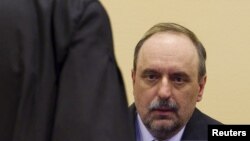BUDAPEST —
The trial of former Croatian Serb leader Goran Hadzic, the last fugitive sought by the United Nations Yugoslav war crimes tribunal, resumed at the Hague on Monday.
Hadzic led Croatian Serb rebels when Croatia's government broke away from Yugoslavia in 1991 and is one of several key officials to face trial at the Netherlands-based court for alleged involvement in atrocities during the Balkan wars.
As president of a self-styled Serbian mini-state in Croatia, the Republic of Serbian Krajina, Hadzic allegedly oversaw atrocities such as the murder and persecution of non-Serbs. He is also accused of having supervised detention centers where torture, beatings and killings of civilians and other detainees were carried out.
Hadzic is accused of leading the forcible transfer of tens of thousands of non-Serbs from across the region under his control during the 1991-1995 conflict. He was apprehended in 2011 near Belgrade after eight years on the run.
Although Hadzic faces 14 counts of war crimes and crimes against humanity, prosecutors on Monday mentioned specifically the killing of patients in what was one of the worst massacres in the Croatian conflict. Serb forces under Hadzic's command allegedly took some 260 non-Serbs from Vukovar Hospital after a three-month siege of the city.
Hague Prosecutor Matthew Gillett said most of the men and boys were slaughtered in November 1991 on a farm in Ovcara, near Vukovar.
"It's been agreed essentially, I am summarizing, that the 194 named victims in the annexed, the paragraph 32 of the indictment, were murdered at Ovcara -- that they were detained when they were murdered, that they were buried in a mass grave at Ovcara, that the grave was protected by U.N. personnel, and [that] the exhumation and autopsies were carried out by international and domestic experts, and [that] representatives of the Croat and Yugoslav authorities were present," he said.
Croatian forensic pathologist Davor Strinovic has investigated the massacre. Speaking as a witness at the trial, Dr. Strinovic said the youngest victim discovered so far was 16 years old; the oldest was 72.
Speaking through an interpreter, Dr. Strinovic said it has been difficult to find and identify the more than 200 victims of the Vukovar Hospital massacre.
"Of course, we are trying and have been trying from the very start to find all of those who are on on the list. We will never stop looking for those people," he said. "To this day, we have not been fully successful in finding all the people from the list. The forensic pathologist said that, in at least one case it was too emotional for survivors to acknowledge a victim's name."
Delays in exhuming the remains have also made it difficult to identify all those who were killed in the massacre, and dozens of suspected victims remain missing.
If convicted on even some charges against him, Hadzic could face life in prison. Monday's proceedings, came only days before the trial of another prominent Serb, Ratko Mladic. The former Bosnian Serb general has been charged with war crimes, including involvement in the massacre of some 8,000 Muslim men and boys by his forces in the Bosnian town of Srebrenica in 1995.
The International Criminal Tribunal for the Former Yugoslavia is under pressure to end its operations. It already closed its main field offices in Croatia and Kosovo, but it is continuing it activities in Serbia and Bosnia.
Russia and Serbia have sharply criticized the tribunal over what they say is its bias toward Serbs following rulings to free two Croatian generals and a Kosovo Albanian former guerrilla commander.
Since it was established in 1993, the tribunal has indicted 161 people for Balkan war crimes, of whom 15 have been acquitted. Proceedings are ongoing for 31 suspects.
Last month, the U.N. Security Council extended the work of the court, but Russia abstained from the vote because it said the resolution did not address the tribunal's "inefficiencies."
The court expects to rule on its final appeals by 2016. After that, any more cases arising from the Balkan wars of the 1990s must be tried in the countries where the crimes were allegedly committed.




